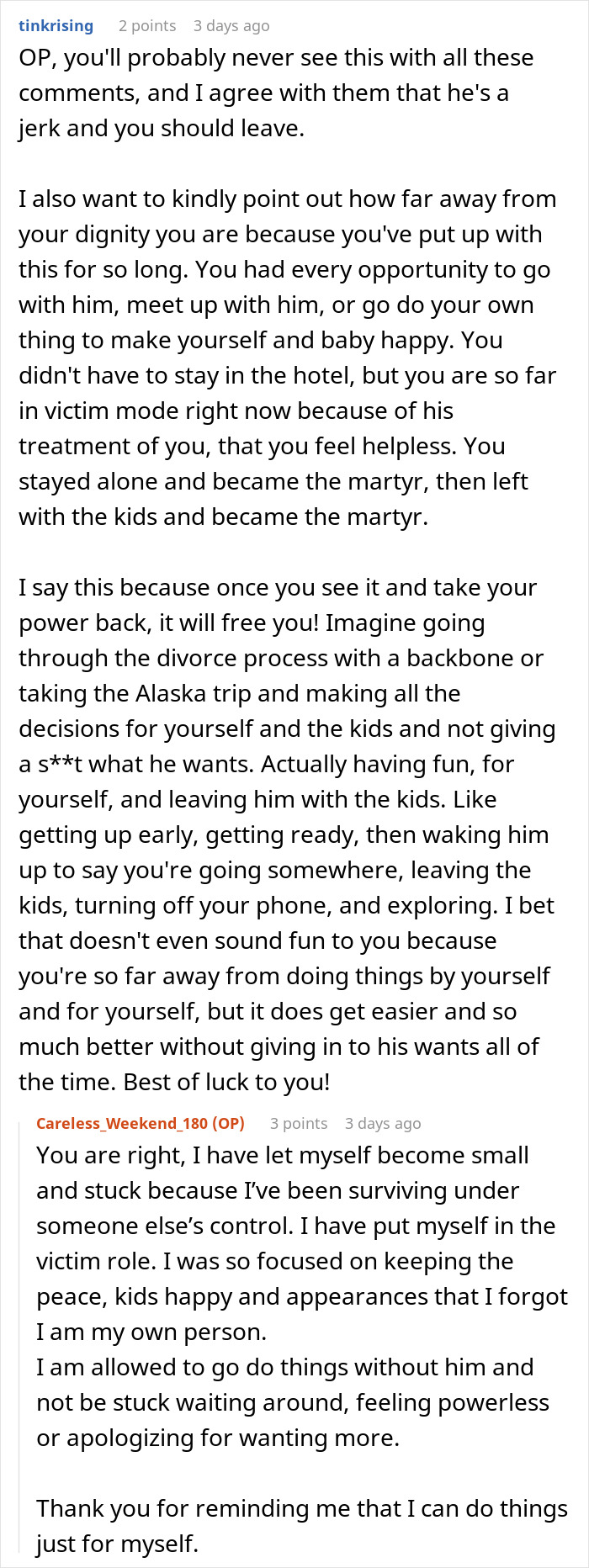Family vacations can be challenging, especially when it’s a trip with small kids. Even the tiniest argument can blow up into a huge fight. In fact, as one study shows, 40% of couples expect at least one fight each day while on a family trip. What’s more, one in 10 couples even break up during a vacation.
A family trip became the tipping point for this couple, too. As the husband wouldn’t spend any time with family and couldn’t wait to go out, his wife soon had enough and simply left. The vacation triggered something in her: years of neglect and carrying the mental load left her feeling more like a maid than an equal partner.
A wife snapped when her husband ignored her and the kids during their family trip

Image credits: unsplash (not the actual photo)
The guy would go out to spend time with friends, leaving his wife alone with a baby

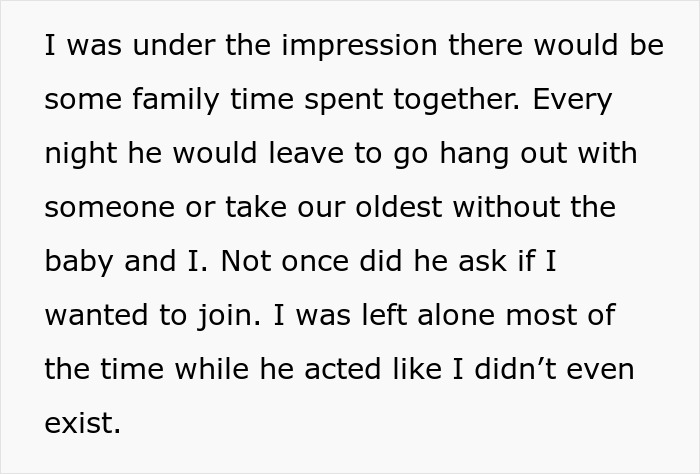




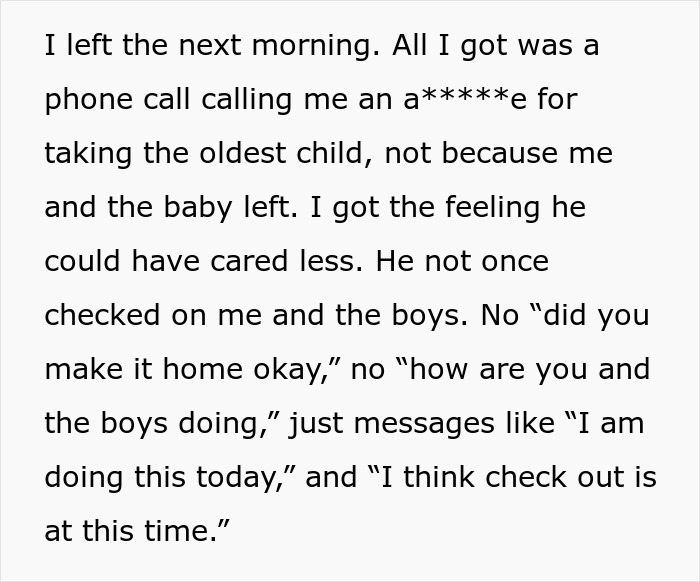

Image credits: unsplash (not the actual photo)

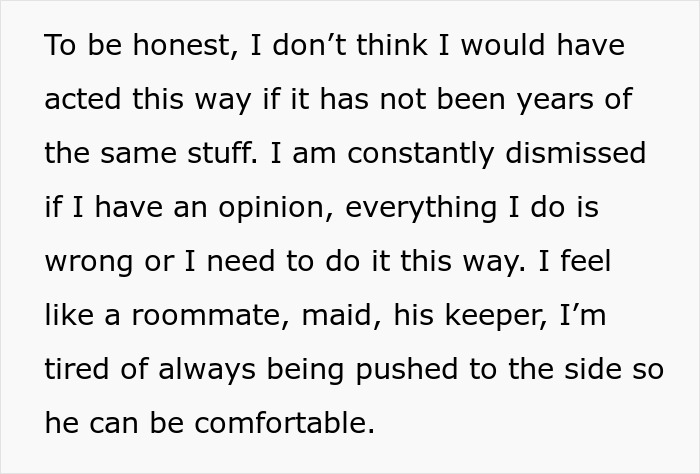



“I do have an appointment with a divorce attorney,” the wife soon wrote in an update
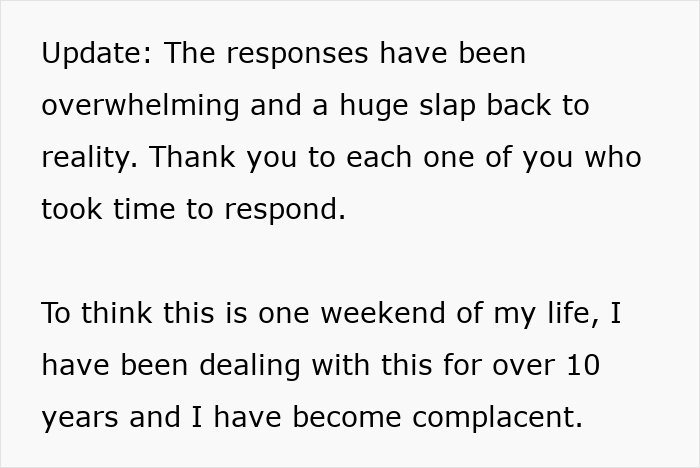

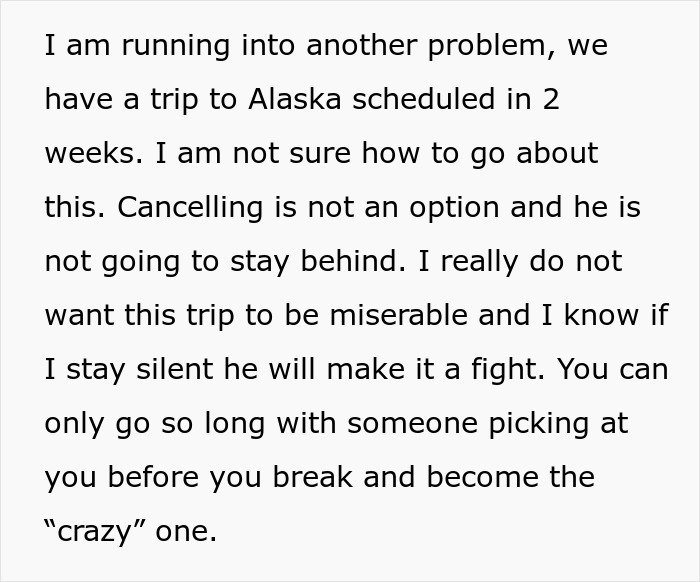
Image credits: Careless_Weekend_180
Communication, alone time, preparation, and humor can make a couple’s or a family trip easier

Image credits: unsplash (not the actual photo)
A family trip with kids can be a great way for couples to de-stress and have some one-on-one time. On the other hand, it can also be a nightmare if one partner is left to do all the childcare and the other goes out to have fun every single night.
That’s why it’s important to consider some things before going on that family trip. Here are the four most significant, according to The Travel Psychologist:
- Communicate, communicate, communicate. Couples don’t have to agree on every single activity. In fact, partners can have different traveling styles, but it’s paramount to be flexible and compromise. If one partner wants to spend the afternoon sipping drinks by the pool and the other wants to see some sights, agree to do one thing today and the other tomorrow.
- Spend some time without each other. There’s nothing wrong with having some “me time” during a family or a couple’s trip. “Remember that alone time is not rejection,” Lexx Brown-James, LMFT, told The Cut. “It’s a person’s way of taking care of themselves.”
- Discuss points of conflict before the trip. If the couple often fights about spending, alcohol consumption, or sleeping in late during a vacation, it’s better to talk about it before the vacation starts. Experts advise telling your partner about your absolute worst trip imaginable to make the conversation more fun. At the same time, this might bring up some things and activities they’d want to avoid.
- When in doubt, laugh. Lucky are the people who have never had any hiccups on trips; they’re simply unavoidable. The worst travel moments often become great stories in the future. “If you can both laugh together about your differences and quirks, then this can be a great way to connect and to bring a lightness to any differences between you,” The Travel Psychologist writes.
Mothers and women are still dealing with a bigger portion of the mental load

Image credits: pexels (not the actual photo)
Who wouldn’t want to be in a relationship where every responsibility is split 50/50? Such relationships, unfortunately, are still a distant dream, as women still tend to get the bigger share of the mental load on their shoulders, even in the big 25.
A 2024 U.S. study found that mothers still take on seven out of 10 mental load tasks. The researchers found that mothers hold “the bulk of the core daily tasks related to family well-being,” and fathers hold “the episodic tasks related to maintenance and finances.”
As life coach and educator Laura Danger explained to us in a previous interview, “the mental load is the decision-making, planning, and organizing that goes into keeping our lives together.”
“For example, if you’re planning a meal for your family, you have to consider your family’s food preferences, allergies, schedules, dietary restrictions, and needs, and so much more,” Laura explained.
“The mental load is making sure all of the boxes are checked off and also that each task interacts just the right way with all of the other tasks. Our lives are like big machines, and it takes mental labor to fit all of the gears together.”
The mental load more often falls on the shoulders of women because of gender roles and loud social messaging. “Men should define themselves through work and women should define themselves through care and domestic labor,” Laura explained the stereotypical social message.
“Why do you stay with this man?” people asked in the comments, wondering why she puts up with such a terrible husband
